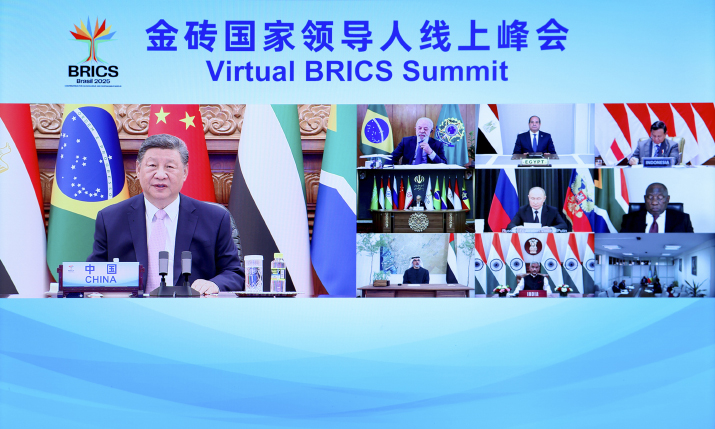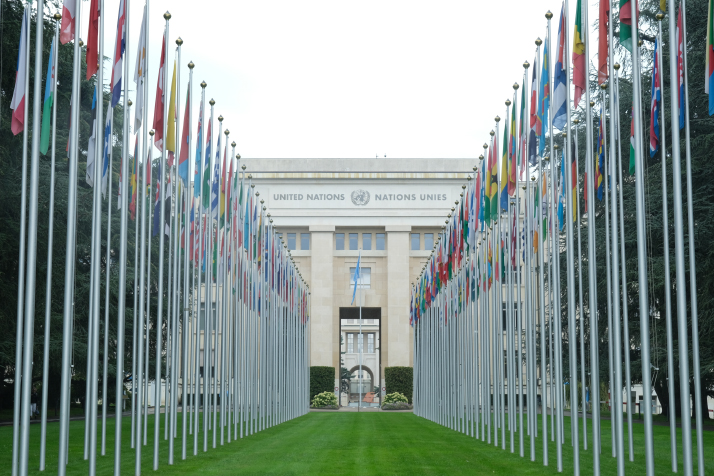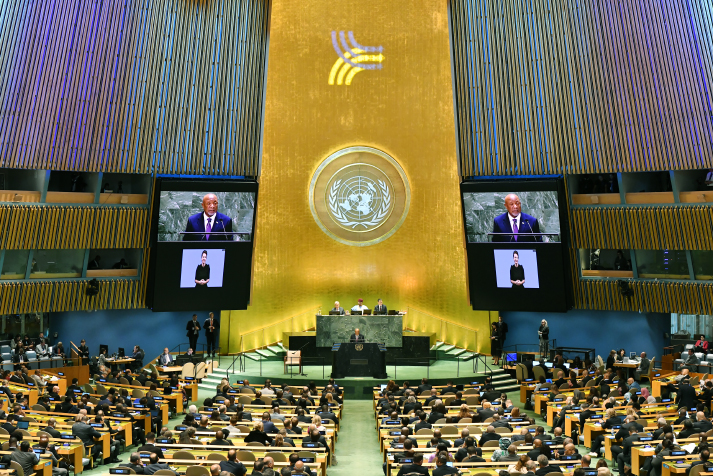Author:Wei ZHAO Release date:2025-09-19 14:24:44Source:BEJING REVIEW

On September 8, Chinese President Xi Jinping joined a Brazil-hosted virtual BRICS summit and delivered a statement titled Forging Ahead in Solidarity and Cooperation.
In his speech, Xi cast BRICS, a group of emerging economies originally consisting of Brazil, Russia, India, China and South Africa that now stretches from South America to the Gulf and the Horn of Africa, as standing at the forefront of the Global South and urged the group to stand together in defense of multilateral institutions and the multilateral trading system and advance cooperation. To this end, he made three proposals: upholding multilateralism to defend international fairness and justice, upholding openness and win-win cooperation to safeguard the international economic and trade order, and upholding solidarity and cooperation to foster synergy for common development.
Together, these proposals are pitched as answers to urgent global needs, both a playbook and a set of principles grounded in current realities and aligned with the broader drift of the times. China aims to inject fresh momentum into South-South cooperation and to give play to the role of BRICS as a platform to defend multilateralism and press reforms in global governance.

Students are on their way home at the new city Kilamba in the suburb of Luanda, Angola, on March 7, 2024. The monumental public welfare project, executed by Chinese firms, comprises 700 buildings and 20,000 housing units (XINHUA)
The larger current
According to Jiang Tianjiao, Associate Director of the Center for BRICS Studies at Fudan University in Shanghai, Xi's proposals reflect the broader logic of the group's cooperation, blending long-term vision with practical steps.
In an interview with Beijing Review on September 10, Jiang explained that the call to uphold multilateralism and safeguard international fairness and justice is framed as both the spirit of the times and a necessary foundation for global peace and development. The emphasis on openness and mutual benefit, he added, directly addresses the headwinds of anti-globalization, with commitments to promoting an open world economy, defending the multilateral trading system, and advancing inclusive globalization as a way to restore confidence in global growth. Finally, the appeal to solidarity and cooperation charts a path for BRICS to deepen pragmatic collaboration, draw on complementary strengths and reinforce the Global South's pursuit of unity and self-reliance.
The virtual summit itself even carried symbolic weight. By bringing leaders together across time zones and continents, it underscored not only the urgency of governance reform but also the Global South's growing resolve to act in concert. The timing was deliberate: coming just two months after the Rio de Janeiro BRICS leaders' meeting in Brazil and barely a week after the Shanghai Cooperation Organization (SCO) summit in Tianjin, a port city in north China, it signaled an accelerating tempo of South-South diplomacy—almost as if the rhythm itself was part of the message.

The Redstone Concentrated Solar Thermal Power Project, one of South Africa's biggest renewable energy power plants in Northern Cape Province, on August 20, 2024 (XINHUA)
The meeting's economic backdrop was stark. Since mid-2025, the United States has slapped steep tariffs on imports from dozens of trading partners including BRICS countries, some climbing to 50 percent, intensifying pressure on an already fragile global economy. In June, the World Bank cut its growth forecast to 2.3 percent, pointing to escalating trade frictions and policy uncertainty, with U.S. tariffs singled out as a major headwind. Just weeks earlier, the World Trade Organization (WTO) had warned that global trade could shrink by as much as 1.5 percent this year.
BRICS countries should promote a universally beneficial and inclusive economic globalization, place development at the heart of the international agenda, and ensure that Global South countries participate in international cooperation as equals and share in the fruits of development, Xi said at the virtual summit.
The numbers lent weight to his case. On September 9, the General Administration of Customs of China released the trade index between China and other BRICS member countries for the first time, unveiling it at the 25th China International Fair for Investment and Trade in Xiamen. The index uses 2009, the year BRICS leaders held their first summit, as the base year with a value of 100.
By 2024, it had climbed to 301.51, a tripling that underscored both the scale and diversification of intra-BRICS commerce.
At the fair, Cai Junwei, an official from the administration, highlighted particularly strong growth in general trade, local-currency settlements and private-sector participation, arguing these trends show how BRICS cooperation is already cultivating resilience against external shocks.
Even the medium carried symbolism. By meeting online, leaders embraced a form of digital diplomacy that reinforced BRICS' image as a pragmatic instrument rather than a ceremonial stage.
Online summits not only facilitate direct communication among a wide range of members and partners, but also enable timely responses to major events and shifting circumstances—such as maintaining international peace or safeguarding the multilateral trading system, Jiang said. That flexibility highlights one of the key strengths of the BRICS cooperation mechanism.

Brazilian President Luiz Inacio Lula da Silva speaks at the launch ceremony of Sovereign Brazil initiative held in Brasilia, Brazil, on August. 13. The initiative consists of a package of measures to support exporters hit by a 50 percent tariff imposed by the U.S. government (XINHUA)
Reforming global governance
Xi's remarks also connected directly to the Global Governance Initiative (GGI). The initiative, unveiled by Xi a week earlier at the SCO Plus Meeting in Tianjin, rests on five core principles: adhering to sovereign equality,abiding by international rule of law, practicing multilateralism, advocating the people-centered approach and focusing on real results.
The GGI reflects China's willingness and capacity to work with other countries in strengthening and reshaping the global governance system into one that hears, sees and benefits all. It aligns with the broader trajectory of globalization, responds to the Global South's calls for a fairer and more equitable international order and offers new opportunities for all nations to engage on equal terms. At a moment when globalization is beset by mounting challenges and growing uncertainties, the initiative stands as a strategic effort to refine and optimize the international governance architecture.
International scholars view it not only as a response to gaps in global governance but also as a shift in narrative. Héribert Adjovi, editor of LeLabel Diplomatique magazine in Benin, told Chinese Social Science Today newspaper on September 9 that the GGI underscores China's determination to transform international governance around the principles of multi-polarity, fairness and inclusive cooperation, grounded in a careful assessment of existing institutions for global security, trade, energy, and technological collaboration.

The Summit of the Future opens at the United Nations headquarters in New York City on September 22, 2024 (XINHUA)
Mariana Escalante of the National Autonomous University of Mexico describes the initiative as an extension of China's public goods diplomacy. It reflects, she noted, Beijing's ongoing efforts to provide international public goods and offer Chinese solutions, reaffirming its commitment to multilateralism and the pursuit of international consensus in foreign policy.
The GGI is complementary to earlier China-proposed frameworks, the Global Development Initiative, the Global Security Initiative and the Global Civilizations Initiative, each designed as a form of public good aimed at correcting imbalances in the international order and addressing deficits in global governance.
Jiang echoed those international perspectives. He explained that the GGI should be understood as a systematic public good introduced by China in the new era to address changes in the global governance system.
According to Jiang, it speaks directly to the pain points of today's multilateral order: the collective rise of Global South countries on one side and on the other, a governance framework still dominated by a handful of Western nations where many interests remain underrepresented. At the same time, unilateralism and protectionism are gaining ground, undermining the multilateral trading system and eroding the international order—expanding the deficit in global governance, he said.
For Jiang, the initiative's core lies in a call to reform the system so it becomes more just, more democratic and more effective, rooted in the principles of the United Nations Charter. As he explained, its emphasis that global affairs should be decided by all, the governance system built by all and the fruits of governance shared by all offers both conceptual guidance and practical pathways for Global South nations seeking a stronger voice in global governance.

Flags of the United Nations and its member states outside the Palais des Nations in Geneva, Switzerland, on September 9 (XINHUA)
As the Global South's most prominent platform, the BRICS cooperation mechanism has grown over nearly two decades from an economic concept into a force shaping the global governance agenda. Since its establishment in 2006, BRICS has not only delivered benefits to its members, but has also provided new opportunities to a wider community of developing nations. At a moment when unilateralism and protectionism are on the rise, the group's relevance is clearer than ever.
Today, the BRICS family accounts for nearly half of the world's population, about 30 percent of global GDP and one fifth of international trade. Member countries are also home to major natural resources, big manufacturers and vast markets. The grouping has already become a major driver of global growth, with the economic center of gravity continuing to shift toward the Global South.
The more closely we work together, the more resilient, resourceful and effective we are in addressing external risks and challenges, Xi pointed out during the virtual summit.
He said China is ready to work with fellow BRICS countries to implement the GGI and advance high-quality cooperation under the China-proposed Belt and Road Initiative, which aims to boost connectivity along and beyond the ancient Silk Road routes. We should leverage our respective strengths, deepen practical cooperation and make our business, financial, scientific and technological cooperation more productive, so as to strengthen the foundation, momentum and impact of greater BRICS cooperation and deliver more practical benefits to our peoples, he added.
*Full text link:
https://www.bjreview.com/China/202509/t20250915_800415060.html